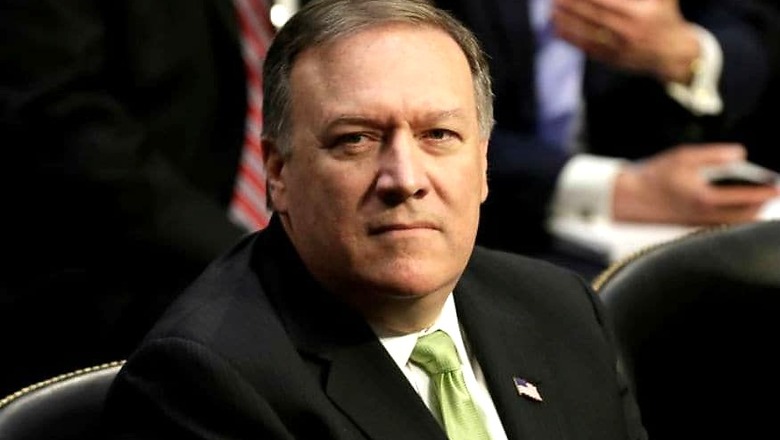
views
Bangkok: US Secretary of State Mike Pompeo said Thursday that Washington isn't asking any Asian nation to take sides as it engages with the region where China is battling for influence and aggressively expanding territorial claims in the South China Sea.
Pompeo hailed an Indo-Pacific engagement framework adopted by the leaders of the Association of Southeast Asian Nations in June, saying it supports sovereignty, transparency, good governance and a rules-based order among other things.
The US-China rivalry fueled by their trade disputes has put the 10-member ASEAN bloc in a tight spot and the new framework is aimed at finding a middle ground to keep on the good side of both Washington and Beijing.
"Look, we don't ever ask any Indo-Pacific nations to choose between countries. Our engagement in this region has not been and will not be a zero sum exercise. Our interests simply naturally converge with yours to our mutual benefit," Pompeo said in a speech at an annual meeting with his ASEAN counterparts.
US relations with ASEAN are guided by a shared commitment to the fundamental rules of law, human rights and sustainable economic growth, he added.
Beijing has been attempting to project its influence globally through its "Belt and Road" initiative, an ambitious development programme of major infrastructure projects.
Washington, meanwhile, has been promoting what it calls a Free and Open Indo-Pacific, an all-encompassing vision that focuses on areas such as rule of law, freedom of navigation and open markets that Beijing regards as directed against it.
Despite Pompeo's comments in Bangkok, he and other Trump administration officials have for months been raising the alarm about the dangers of countries allowing significant Russian and Chinese investment in their technology and infrastructure sectors.
Pompeo's comments Thursday came a day after China warned against any attempt to sow discord between Beijing and ASEAN countries by playing up disputes over the South China Sea.
China's assertive territorial claims in the South China Sea, through which a third of global shipping passes, has drawn rebuke from the United States and become a flashpoint for a region in which ASEAN members Vietnam, the Philippines, Malaysia and Brunei all have claims to the waters. ASEAN and China have for years been working on a Code of Conduct meant to govern the waterway and make the area more stable.
Chinese Foreign Minister Wang Yi later Thursday said Beijing will not let anyone block its right to development. He said Pompeo said
Washington has no intention to contain China's development and expressed hope to cooperate and advance trade talks.
"It is neither fair nor possible to try to obstruct China's development," Wang said in remarks to reporters provided by the Chinese delegation after talks with Pompeo on the sidelines of the ASEAN meetings. "China's development is peaceful with strong internal impetus.
It will not be stopped by anyone," Wang said he asked the U.S. to "exercise prudence in words and deeds" after making clear China's position on South China Sea, persecution of Muslims in China's northwestern Xinjiang region and pro-democracy protests in Hong Kong during the meeting.
He also urged the US to abide by the one-China policy and deal with Taiwan-related issues with caution, in reference to U.S. weapon sales to Taiwan, which China considers part of its territory.
Pompeo also mentioned recent press reports that ASEAN member Cambodia had signed an agreement allowing the Chinese navy use of a naval base on the Gulf of Thailand.
China is Cambodia's closest political ally and main aid donor and investor, and in turn supports China's positions in international forums. However, Cambodian Prime Minister Hun Sen denied the reports, pointing out that his country's constitution does not allow foreign military forces on its soil.
"The United States welcomes Cambodia's strong defense of its national sovereignty in the region," Pompeo said without elaborating.
The US has been highly critical of Hun Sen's authoritarian rule, and Pompeo appeared to be implying Washington would hold the Cambodian leader to his word.




















Comments
0 comment